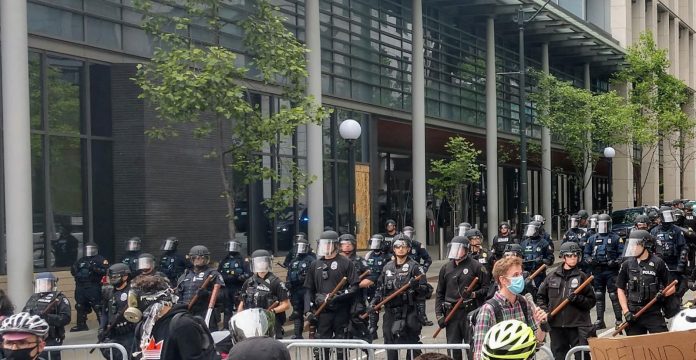
What I’ll do about it as your next City Attorney
Seattle’s elected officials bear responsibility for the failures of leadership that led to conflicts between community and far-right provocateurs this week, but they’re not the only ones to blame for the violent escalation.
The leadership of the Seattle Police Officers Guild (SPOG) is also at fault for perpetuating a culture that enabled the use of excessive force and brutal treatment of LGBTQ+ counterprotesters. If we ever hope to create real public safety for everyone who calls Seattle home, we cannot let this episode pass without scrutinizing SPOG’s continuous undermining of more than a decade of efforts at reforming the Seattle Police Department.
Let me be clear: I believe there will be a need for police officers in Seattle for years to come even if we fully fund every crime prevention program available. As a public defender, I know poverty is what drives most crime. We have the resources in Seattle to lift people out of poverty, but decades of government neglect and deprivation of public resources that disproportionately impact my clients aren’t going to be fixed overnight. It will take sustained effort and commitment to repair those gaps and create systems that actually work for everyone.
While that work is ongoing, however, we can no longer allow SPOG leadership to remain an obstacle to accountable, constitutional policing. By continually sabotaging reform after reform intended to hold officers accountable for abusing their authority in situations like this one, SPOG leadership has all but guaranteed this unacceptable treatment of nonviolent protesters will continue.
City Attorney can check SPOG’s extremist leadership
As City Attorney, I will use the power of my office to take on SPOG’s leadership in three ways: holding officers accountable for abusing their authority, refusing to prosecute cases based on testimony from officers with a history of dishonesty or misconduct, and advocating for police accountability legislation in Olympia.
First, and most obviously, the City Attorney’s Office should be willing to hold officers to the same standard as the public when they cause harm in our community. For example, when the King County Prosecuting Attorney’s Office declined to file felony charges against SPD officer Kevin Dave for killing pedestrian Jaahnavi Kandula, Seattle City Attorney Ann Davison had an opportunity to at least file misdemeanor charges against him for reckless driving. She opted instead to merely issue a citation and allowed him to avoid even having his license briefly suspended.
Second, the City Attorney’s Office can discourage misconduct by refusing to prosecute cases that depend on the testimony of officers with a track record of dishonesty or repeatedly use excessive force. In practice, many of these cases are ultimately dismissed anyway once public defenders expose how an untrustworthy officer misrepresented a witness’s statement, but only after a tremendous waste of time and public resources. Instead, my office will set clear expectations that any officer who wants their work to result in charges being filed must conduct themselves in a way that inspires the community’s confidence in SPD.
Finally, we must change state law so that SPOG leadership no longer holds a veto over police accountability at the bargaining table when negotiating the next police union contract. Retired Judge Ann Levinson, widely regarded as Seattle’s foremost expert on police accountability, advocated for a version of this law in 2020 but it failed to pass.
State Representative Shaun Scott also introduced legislation during session this year to circumvent SPOG and clear a path for Seattle civilian responder expansion but ran into opposition due to slippery-slope concerns over bargaining rights. However, Scott’s bill was a step in the right direction.
Bargaining rights and police accountability
As a member of a union myself, I know the importance of allowing public employees to band together to negotiate for better pay, quality benefits, and safe working conditions. I also know many in the labor movement are skeptical of any reform, no matter how well-intentioned, that limits any union’s authority to advocate for its members.
But as the MLK Labor Council acknowledged in 2020 when they expelled SPOG from their ranks, using the tools of collective bargaining to evade accountability when an officer abuses their authority undermines the labor movement’s commitment to racial justice. As City Attorney, I would make passing this reform one of my office’s top legislative priorities.
Taken together, these policies will support the officers doing quality police work, provide meaningful disincentives for misconduct, and allow the City Council and Mayor’s Office to construct accountability mechanisms to root out bad apples poisoning the culture of SPD. Insisting that those who enforce the law follow it themselves doesn’t undermine the police; it restores community confidence in SPD’s ability to play its role in providing real public safety for everyone.
Nathan Rouse is a public defender, legal advocate, and father running to be Seattle’s next City Attorney. He has spent his public defender career standing up for people who have been failed by broken systems and fighting for fairness, accountability, and second chances. Nathan is running because our city needs a justice system that works for everyone—not just the powerful.


